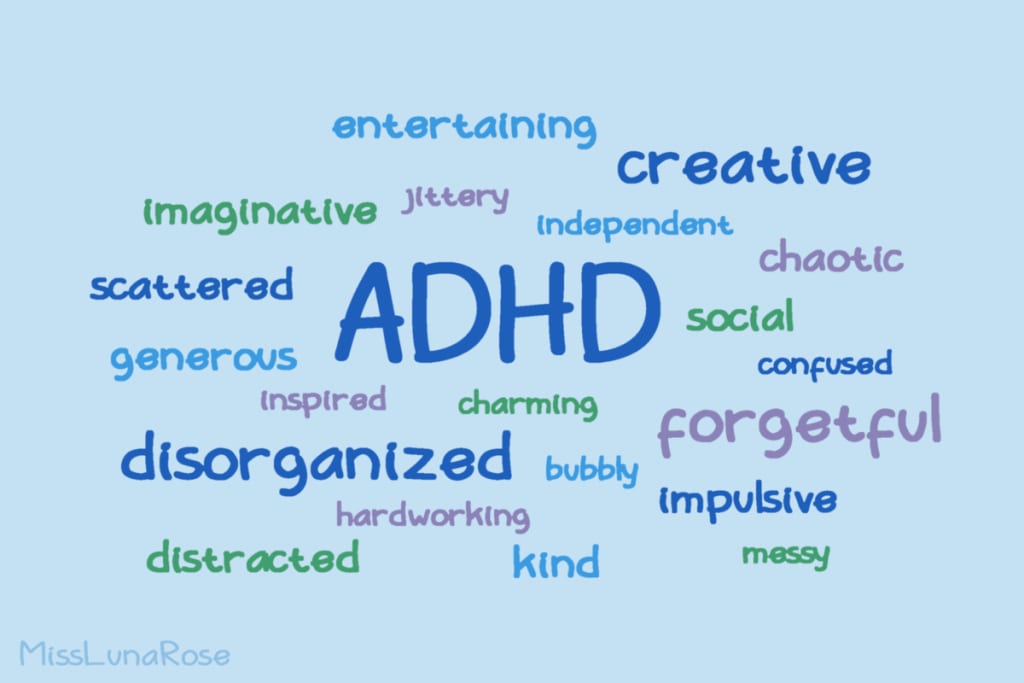
Over the past few weeks, I've been periodically seeing posts online about how ADHD presents differently in girls than boys, leading to being diagnosed late, if at all. As such, there is less awareness and understanding surrounding girls with ADHD, and it’s something that has been playing around my mind a lot. As I write this, I have a million other things that I should be doing, but ironically the idea to write this is distracting me from those other tasks. So, I'm here to talk (and probably ramble slightly) about my experiences so far as a female with late-diagnosed ADHD. Perhaps someone out there will benefit from it and seek the help they need. Whatever happens, if this is useful to even one person, or does some good in some way, then I'm happy. Now for some quick disclaimers: the things i discuss here are from my own experiences. Where I have mentioned scientific findings, I have cited the articles I got that information from.
On the 27th February 2020, a few months before I turned 23 years old, I was diagnosed with ADHD. I will discuss the emotions that came with this diagnosis, and the effect it had on my life. But first I'm briefly going to take you back in time and talk about my formative years, and the signs of my ADHD that went unnoticed or attributed to other disorders. It is a little long-winded and may not be interesting to anyone other than me, so feel free to skip past this section. I’ve used sub-headings for this reason.
Pre-diagnosis
Research states that ADHD presents itself in girls predominantly as inattentiveness (Rucklidge, 2008) whereas hyperactivity or disruptiveness tends to be a primary symptom in boys. This type of behaviour generally raises more concerns and is possibly one of the reasons for a higher diagnosis rate in males.
Having said this, I can remember being a rather obstreperous child throughout primary school. Generally, this occurred more inside of the classroom, when I was surrounded by peers my own age, and many exciting distractions, as opposed to in my own home. I was frequently chastised for being a distraction to other kids, and I was often separated from my friends in an attempt to curb my disruptive ways. I would expect the school to have had a few chats with my parents regarding my behaviour, but weirdly, I don't think this happened, at least not to a serious extent. My yearly report-cards given to my parents noted my struggles with attentiveness and my tendency to be disruptive, but as far as I know, there was no other mention of it.
Cut to high school, and things changed. Somehow, by the middle of year seven, I was grading at a much higher level than average. I had also become less disruptive in the classroom, struggling to form bonds with my peers and preferring to largely keep to myself. My teachers did notice that I rarely seemed to be paying attention during lessons. Due to my grades however, this inattentiveness was attributed to me simply not being challenged. In English and drama (my strongest subjects) I was accelerated to GCSE level at the end of year eight, but this did not mitigate my inattentiveness. Still, this was assumed to be because I wasn't challenged enough. In reality, I simply found it hard to focus, often finding myself districted by small things such as a power socket being left on with nothing plugged into it. This then led to a rabbit hole of thoughts. “What had previously been plugged in to it? I wonder how much it costs to supply electric to such a huge building; they must have to power a lot of things. How many lights are in this classroom? Oh, one of them is flickering. Maybe there’s a loose connection somewhere. Will that cause a fire? What would happen to us if there was a fire in the school? Would we be sent to a different one? I can’t decide what other school in the town I’d want to be at.” On and on this would go, a constant stream of thoughts, some related to the one that came before it, others completely random. Until the lesson was suddenly over and I had no idea what had been said. But I was a child, and I accepted the explanation given to me. I wasn't being challenged. I was beyond high school level. Unfortunately, being given this attitude and sense of security in my own abilities did not prepare me very well for college.
At college, the stakes were higher, the classes were harder, and I was no longer smarter than everyone in the class. Constantly being told by high school teachers that I was “ahead of everyone else” meant I did not even consider that there would come a point in life where other people would catch up, and actually overtake me. Embarrassingly, as a child a part of me assumed I would always be ahead of everyone else. This was, of course, not the case at all. Combine this, my struggles to pay attention, and new freedoms meaning I didn't HAVE to go to class, and I was suddenly no longer over-achieving. In fact, I was failing. In my first year, my mental health also began to deteriorate. I will not go into the details, but at the age of sixteen I was diagnosed with depression and anxiety. As such, my horrific grades and all my other struggles with class were then assumed to be due to these mental health issues. And so, my ADHD remained unnoticed. Interestingly, I've since learnt that girls with ADHD are more likely to develop problems with anxiety and major depression than their male counterparts and compared to girls without ADHD (Biederman et al., 2008).
Once again, I accepted the explanation given to me. My problems were due to my mental health struggles, and no other reason. Indeed, my depression and anxiety are a contributing factor, but I didn’t consider that there was something else at play too. Until University. Early on in my second year, I failed an exam. Not because I didn’t understand the material, but because it was a computer-based exam and the sound of a room full of students typing, coughing and rustling was too distracting for me to even read the questions. I became increasingly distressed and anxious, until I half walked, half ran, out of the exam room an hour and a half before the exam was due to finish, and I had barely written anything. I’d experienced this in school exams, but this time was worse. The NHS website states that inattentiveness and distractibility for people with ADHD sometimes increases into adulthood, so this is possibly why. Now, it would be reasonable to assume general anxiety was the cause of this. But I knew that it wasn’t just a simple anxiety attack. Rather than being distracted because I was anxious, I had become anxious because I was distracted – if that makes sense. I was very aware that I couldn’t focus due to the sounds and movement around me, but this was an important exam, and I tried to make myself focus. But to no avail, and this overwhelmed me. I had also found it hard to pay attention in lectures over the last year and a half, and I knew that eventually, as the course got harder, I would fall very far behind. It was then that I decided to ask for help.
Diagnosis process
I had become increasingly suspicious that I may have something like ADHD, but I didn’t want to be accused of self-diagnosing, so I didn’t tell the university of these suspicions. Instead, I just expressed that I felt something was wrong with me, but I didn’t know what, and that I needed help. They gave me an appointment with an in-house councillor, and for this I will be forever grateful to the university, as this was the starting point of everything changing for me.
The councillor asked some preliminary questions about my general well-being and my mental health issues, but upon me wondering if something else was going on, she began to question my experiences throughout childhood and adolescence. I told her everything that I have written about in the previous section of this account, plus additional things that I have omitted from this because it is already too long. Watching the councillor furiously writing notes upon pages and pages of paper, and watching her expression become more and more concerned as the session went on, I began to feel that perhaps I was right, perhaps there was another issue at play.
The councillor then referred me to a short, preliminary evaluation to assess whether there was a possibility of a disorder such as dyslexia or ADHD. My results indicated that I should be referred to a psychologist for a full assessment and, if something was found, a diagnosis. The session with the psychologist was expensive, but the university was good enough to foot the bill for two-thirds of the cost, so that I could afford it. This is another thing that I will be eternally grateful to them for. The assessment was long and challenging, and the wait I endured for my results following it was one of the most nerve-wracking few weeks of my life. But, as previously stated, on the 27th February 2020 I got my diagnosis.
Post-diagnosis
Having a diagnosis completely changed the trajectory of my degree. Had I carried on the way I was going and not sought help, I probably would have finished my second year with, at best, a third-class result. Perhaps I would even have failed. However, having a diagnosis meant I got extra support from my university. Access to resources, extra time in exams, un-questioned extensions on assignments. It was even suggested that I may be able to take earplugs into exams to block out distracting noises. All of this, and a better understanding of myself and how my brain worked, meant I finished the year with 68.25% - a high 2:1.
I’m not going to pretend that being diagnosed was an entirely happy affair. Unfortunately, the term “ADHD” tends to carry some negative stereotypes. It is associated with unruliness, bad behaviour, and sometimes rudeness. So, I felt a little unhappy with having this new “ADHD” label. But, as with everything, educating myself on the subject dispelled this feeling. Understanding needs and limits for people with ADHD is key. For example, it is assumed that people with this disorder cannot focus on anything – this is not strictly true. It is more about being unable to focus on the “right” things. People with ADHD can have trouble focussing on things that may be important, but that they are less interested in, or do not provide immediate rewards. On the other hand, they can be incredibly focussed on something that they enjoy. Sometimes this focus can be extremely intense. If it is something they’re interested in, they can “hyper-focus” – remain fixed, unwavering, on a task for hours on end. I’ve found that undertaking a task I find less interesting in very small time increments (say, working on it for just ten minutes at a time) can help me actually see it through to the end – albeit at quite a slow pace. Hyper-focus sounds good, but it can be unhealthy. I’ve found myself working on a project I enjoy for eight hours straight without taking a break, and without realising that it has been so long. When I finally finish my task, I end up in a state where my vision is impaired due to staring at one thing for too long, hungry, groggy, and nauseous. To combat this, when undertaking a task I’m excited about, and that I think may cause me to hyper focus, I will set alarms on my phone to go off at certain times to break me out of my – for want of a better word – trance, and remind me to take a break. But of course, everyone is different, and this may not work for some.
Forgetfulness and misplacing things are also common symptoms of ADHD. But understanding that this is just part and parcel of the disorder makes it easier for the affected, and those around them, to deal with. In the past I’ve become annoyed or angry with myself for being like this, as have other people. Had I been diagnosed earlier, living with it may have been easier. But you can’t change the past and I am now learning strategies that work for me – small things, such as sticking post-it notes to my front door to remind me to pick up my house keys when I leave. Or sticking notes for my university assignments to my living room wall where I can always see them, instead of writing them in a book that I am likely to forget about and never look at again, or worse, lose.
I once used to get annoyed at myself for my inability to finish one task before starting another. Now that I understand it is part of a disorder, I’m learning to work with it, instead of against it. I live my life in a somewhat disorganised way, with many projects to work on at any given time, where it would be easier to work on things lineally - to just finish one thing before starting another. It would presumably take the same amount of time but be less stressful. However, I have found that working on many things simultaneously means I tend to get more done overall. Instead of trying to force myself to work on one task and inevitably getting distracted and not getting much done, when I feel myself becoming inattentive to one task, I immediately switch to another. This way, I utilise my time effectively for what works for me.
Of course, these are some very basic examples of how I have learnt to deal with some of the common symptoms of ADHD. There are many other symptoms and I have linked to NHS website at the end of this piece. I am also still learning what works for me and helps me live with this disorder. Experiencing similar things to what I’ve discussed does not mean you have ADHD, but I would recommend checking the NHS website for signs and symptoms in children and adults, depending on who you’re looking for. And if you’re having any niggling suspicions about yourself, as I did, please do seek help. It might change your life.
If you read the whole of this piece, then to be honest, I’m impressed. And I apologise - it’s much longer than I thought it would be, but I’ve tried to include as much as I can without it being ridiculously excessive. Mostly because someone may read this and identify with something I’ve said and realise that the niggly feeling that something’s wrong may not be totally unfounded. Trust your gut on things like this, you know yourself better than anyone.
NHS site:
https://www.nhs.uk/conditions/attention-defecit-hyperactivity-disorder-adhd/
References:
Biederman, J., Ball, S.W., Monuteaux, M.D., Mick, E., Spencer, T.J., McCreary, M., Cote, M., Faraone, S.V. (2008) ‘New Insights Into the Comorbidity Between ADHD and Major Depression in Adolescent and Young Adult Females.’ Journal of the American Academy of Child & Adolescent Psychiatry, 47(4) pp. 426-434.
Rucklidge, J.J. (2008) ‘Gender differences in ADHD: implications for psychosocial treatments.’ Expert Review of Neurotherapeutics, 8(4) pp. 643-655.






Comments
There are no comments for this story
Be the first to respond and start the conversation.